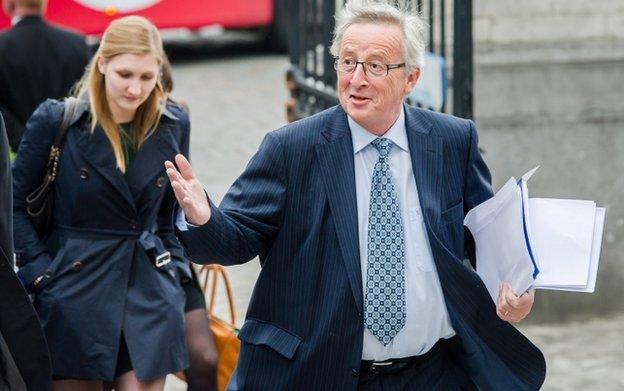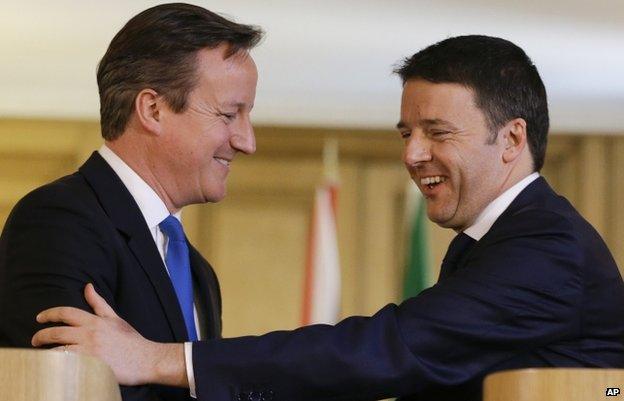Cameron's European battle over Juncker
- Published
- comments

European heads of government already have a qualified majority backing Jean-Claude Juncker
In Brussels they are looking for signs of a British white flag, such is the certainty that David Cameron has lost his battle to stop Jean-Claude Juncker becoming the next president of the European Commission.
Words and phrases are studied and scrutinised for the first sign of retreat. So when today a senior British government official opined that they were "not throwing in the towel", that was judged an admission of backs to the wall.
Likewise with Mr Cameron's view that the die is not cast.
The reality is that among Europe's heads of government there is already a qualified majority in favour of Mr Juncker. The UK would need the support of countries representing 38% of the EU's population to block the nomination and that, currently, is not in sight.
It was interesting today to see the senior government official tossing out other names for Europe's top jobs: Barnier, Lagarde, Katainen, Lamy, Letta, Thorning-Schmidt. But as far as the rest of Europe is concerned there is only one name on the table and that is Juncker.
The British case is based on two arguments:
Firstly, a point of principle. The process that saw Mr Juncker emerge as frontrunner was "deeply flawed" and would lead to a "profound shift" in the balance of power between European institutions. There is considerable support for that argument.
Secondly, doubts about Mr Juncker's suitability. Downing Street believes he is old guard, a signed-up member of the ever-closer union crowd. That is not a widely-shared judgement.
Yet even here Mr Cameron won some support today. Neelie Kroes, vice-president of the European Commission for the digital agenda, said: "We need fresh faces with fresh ideas, not the generation that managed the lead-up to crisis and the great recession and stagnation that followed it.
"I think we seriously need to consider female candidates for the Commission and Council president posts. But most of all we need the highest quality candidates that can lead us into the more open and digital future."
Mr Cameron is defiant. "If you want reform in Europe," he told MPs today, "you have got to stand up for it."
His most important potential ally is Italian Prime Minister Matteo Renzi.

The UK prime minister has been on the phone to Matteo Renzi
Mr Renzi has not played his cards yet. And it would be hard to appoint a president of the Commission without the support of the UK and Italy.
Mr Cameron has been on the phone to Mr Renzi. The Italians have a clear agenda as set out by a Renzi aide: "We're going to be demanding changes in policy. We can't accept austerity policies anymore. We'll see how we can change them."
Italy is in a pivotal position and that is why the President of the European Council, Herman Van Rompuy, was seeing Mr Renzi for lunch.
There were hints that Italy could be offered some flexibility over the budget rules, but Angela Merkel firmly slapped down that idea today. "There is no need to change the stability pact... the stability pact as it now stands already contains all the flexibility we need to overcome problems."
Mr Renzi's interest is not that of Mr Cameron. The Italian prime minister's major concern is to revive the Italian economy. If he believes the EU is committed to growth and jobs, he is likely to line up for Mr Juncker.
Whatever the outcome of the talks in Rome, there could still be a twist or turn. Downing Street knows that deals can be made at the 11th hour but it is not looking good for Mr Cameron.
If he loses, he might be offered a package of reforms that would help him sell continued membership of the EU to a largely sceptical British public.
It is possible that the UK might be offered a key economic post for its commissioner. A kind of consolation prize.
But even so, defeat would be a humiliation and then some of the prime minister's Eurosceptic critics are likely to line up to say: "We told you so; you can't get reform in Europe."